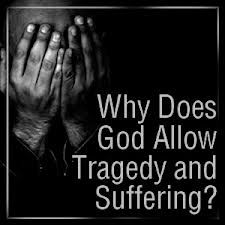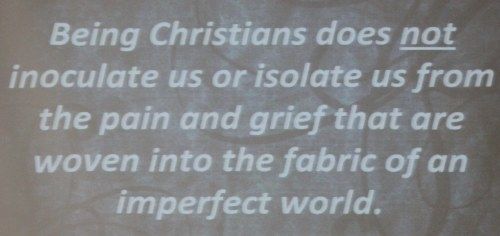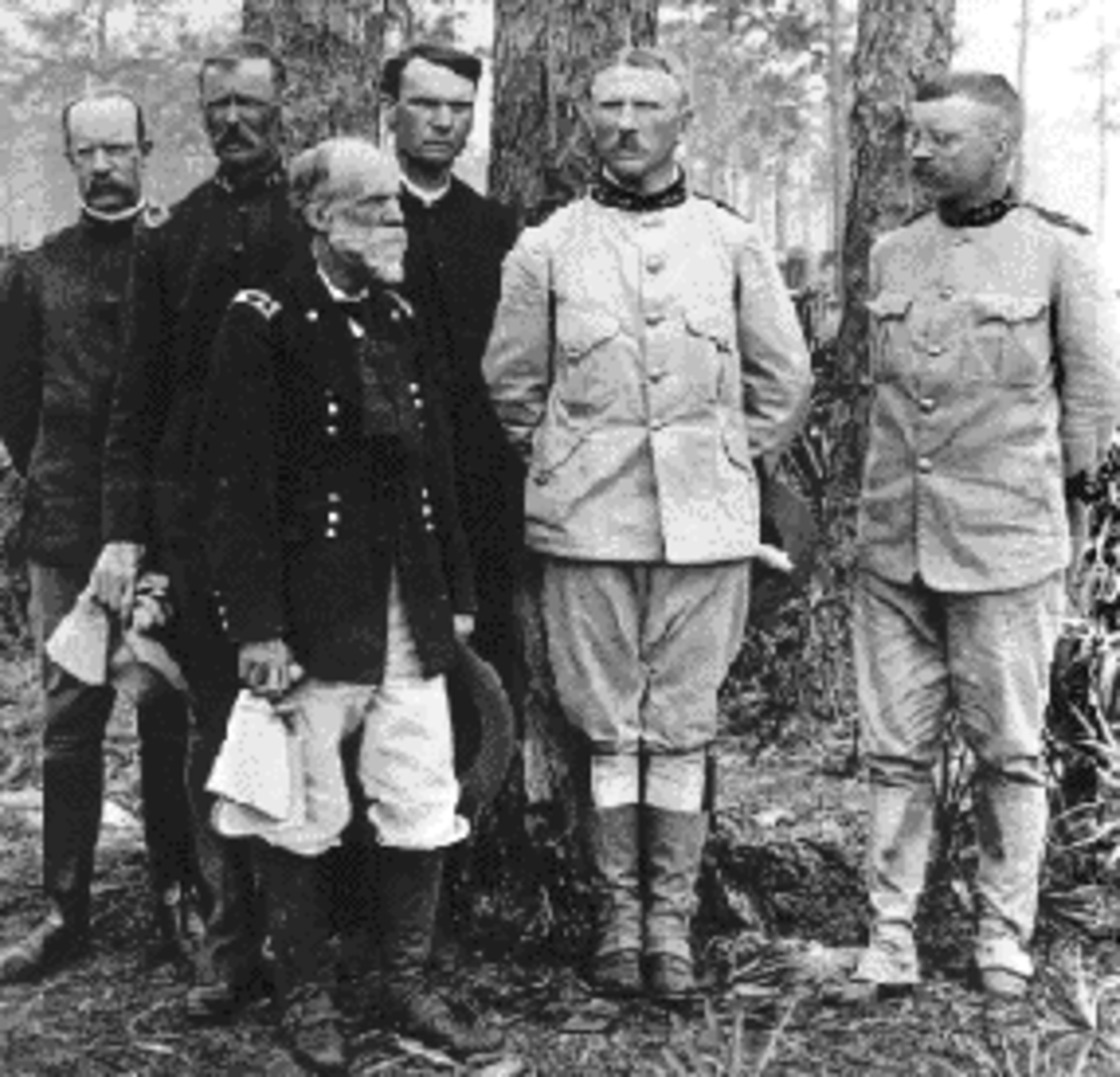The Problem Of Suffering

Why I'm making this page about the problem of suffering:
Job said "Man is born for trouble as the sparks fly upward." (Job 5:7) I'm making this page about the problem of suffering because, even though as Christians, we are told by Jesus in John chapter 16 that in this world we will have tribulation, the problem of suffering can pose a real problem when we are trying to share our faith. The problem of suffering is one area of Christian apologetics. It addresses the age old question of "Why do the righteous suffer?" Or "If there is a God and He is good, why does he allow so much suffering, pain and misery to exist in the world?" The problem of suffering is related to the more general problem of evil, first posited by he Greek philosopher Epicurus, and which is defined by Wikipedia as "the question of how to reconcile the existence of evil with that of a deity who is omnipotent, omniscient, and omnibenevolent" Read the Wikipedia article, or, according to the Standard Encyclopedia of Philosophy, "...whether the world contains undesirable states of affairs that provide the basis for an argument that makes it unreasonable for anyone to believe in the existence of God." (Read the SEP article.)
So stay with me. If you're an unbeliever but a serious seeker of truth, you just may find some here. If you are a Christian, you may learn something to help in sharing your faith with non-Christians. We will first examine the logical arguments for both the problem of evil in general and the problem of suffering in particular. Then we will look at the various reactions which people have had to the problem and finally we look at purposed answers to the problem. We will also try to tackle the related question of healing and the will of God. So sit tight and don't let the first few modules fool you. There is an answer, and hopefully you will find it by the end of this page.
Fact: There is evil in the world!

The basic Problem of Evil in general - [From Wikipedia]
First, let us look at the problem of evil. Here in nutshell is the logical argument. It is actually more complicated than this, but I have summarized it here, just to give you an idea. For a more detailed look, click the blue link to the Wikipedia article or check out the SEP article in the the link list below:
- If a perfectly good, all knowing and all-powerful and god exists, then evil does not, since he would not want it and thus would not allow it.
- There is evil in the world.
- Therefore, a perfectly good, all knowing and all-powerful and god does not exist.
Read the entire article from the Standard Encyclopedia of Philosophy:
This is a really detailed article on the subject:
- The Problem of Evil from the Standard Encyclopedia of Philosophy
This discussion is divided into nine sections. The first is concerned with some preliminary distinctions; the second, with the choice between deductive versions of the argument from evil, and evidential versions; the third, with alternative evidentia
Or read more about the problem of evil:

The Problem of suffering, specifically: - [From Wikipedia]
Then, let us look at the problem of evil, in particular, it being a branch of the the problem of evil. Simply stated, the problem of suffering says :
- There is quite a bit of intense suffering in the world.
- A wholly good omniscient, omnipotent being would prevent the occurrence of any intense suffering it could, unless it could not do so without thereby losing some greater good or permitting some evil equally bad or worse.
- (Therefore) a wholly good , omniscient, omnipotent being does not exist.
A more detailed statement of the problem of suffering - [From Apologetics Press]
Apologetics Press states the problem in the following steps:
- "If God is all-powerful, He could do something to prevent or end suffering.
- If God is all-loving, He would want to prevent or end suffering.
- There is a tremendous amount of suffering in the world.
- Therefore, God either is not all-loving or not all-powerful."
Read more about the problem of suffering:
Reactions to the problem of suffering: - [From Apologetics Press and Patheos Library]
Different people take different approaches to the problem of suffering:
- Some Skirt the problem "by denying one of the above three premises."
- Some simply dismiss the problem by saying, in the words of a Simon and Garfunkel song, "God has a plan, but it's not available to the common man."
- As Patheos Library points out: "Recently some Christians have stopped viewing evil as an existential problem, and begun viewing it as a practical problem. Some, like Alyosha Karamazov...in Dostoevsky's novel The Brothers Karamazov, believe that the evil in our midst requires that we act to end it. Explanations or justifications of evil's existence...are not at all meaningful."
- Others attempt to answer the problem, since the Bible, God's word, "is not exactly silent on the subject."
How do you deal with the problem of suffering?
The basic question:
It seems thus, that the basic question is this: "If God is good, why do we hurt." That's the title of the resource listed below. It's a special 10-pack, ideal for church giveaways, grief support group members, or individual gifting to a loved one. This resource is great for supplying the encouragement we crave when we're most in need.

Answers to the problem of suffering: - [From Patheos Library and Apologetics Press:]
Here are some suggested answers to the problem of suffering from church fathers, theologians and everyday believers.
- "Evil, is necessary for human moral and spiritual development and is part of God's purpose." We get this idea from Irenaeus, the 2nd century Bishop of Lyons, He said that "God created humans in a morally and spiritually imperfect state so that they can strive in response to suffering, in order to grow into full fellowship with God."
- The theory of free will. We get this from Augustine, Bishop of Hippo. He said that "Suffering is the price we pay for freedom of choice."

- We are living in the best of all possible worlds. We get this idea from the 18th-century philosopher G.W. Leibniz, who believed that "despite our suffering, and the tragic,,,events..., God is in control, ...and When something terrible happens, it is not because God is not involved. [He] allowed it in order to prevent an even more terrible event from occurring."
- "God's connection with the created order is so profound that [He] has bound divine providence and omnipotence to the human experience. This is the viewpoint which says that God's activity in the affairs of creation, then, is powerful, but not directive or controlling."
- "Creation is a revelation of God's goodness"... We get that from The Psalms . Evil, also a part of God's creation, must reveal that inherent goodness as well, if we know how to look."
- The Apologetics Press stresses that we should realize first of all that the origin of suffering is sin. Adam and eve disobeyed God, bringing the judgement of God upon humanity.
- Secondly we must consider the sovereignty of God as set forth in the book of Job.
- Thirdly we must consider the righteous and justice of God as displayed in the death of His son on Calvary as the payment for our sins.
I just really skimmed the surface here. To grasp it, you really should Read the entire AP article.
Another answer to the problem- that of Epicurus:

Read more on the problem of suffering:
Listen to these varying views of the Problem of Suffering:
Still more on the problem of suffering:
Suffering is a part of life.

In Part 2 of the book "The Triumphant Church, John Piper points out that all experiences of suffering in the path of Christian obedience, whether from persecution or sickness or accident, have this in commone: they all threaten our faith in the goodness of God and tempt us to leave the path of obedience. Therefore, every triumph of faith and all perseverance...are testimonies to the goodness of God....the suffering of sickness and the suffering of persecution...are both intended by Satan for the destruction of our faith and governed by God for the purification of our faith."
For more on the suffering of Christians around the world through persecution, check out this hub:
- The Persecuted Church
Since we have it so easy here in this great country of America, it is easy to forget that our fellow Christians around the world--are suffering for their faith.

Divine healing vs. Divine will:
When Jesus was on earth, he went about healing those who were sick, diseased or oppressed (Matthew 4:23 & 9:35). Some Christians have taken this along with the verse in chapter 53 of Isaiah that says "by his stripes we are healed" to indicate that it is God's will that everyone be healed. But is this really the case? When the Apostle Paul asked God to heal him of his chronic sickness, which he described as "a thorn in the flesh," the LORD refused, saying "My grace is sufficient for you and my strength is made perfect in weakness." (I Corinthians 12:7-9). He further states in 2 Timothy 4:20 that he left Trophimus sick. If healing is for everyone, why didn't he lay hands on him and heal him? Is healing for everyone, or does God have a greater plan in our suffering? Peter says in I Peter 4:19, "let them that suffer according to the will of God commit the keeping of their souls to him in well doing, as unto a faithful Creator."
There has been much written on the promblem of suffering and on Divine healing Check out the books on these subjects written from oposing sides (below). Then give your opinion in the "WHAT DO YOU THINK?" duel below.

Works on Divine Healing from both sides:

What Do YOU Think?
Is Divine healing for everyone today?
Now tell why you answered as you did.
Please state in depth your opinion on either side of this issue.
One in-depth answer to the on the problem of suffering: - Check out this link:
- "THE PROBLEM OF SUFFERING" Why Does God Allow It?
An in-depth look at the problem of suffering from God's point of view. In particular it looks at how suffering effects our lives and testimonys.










